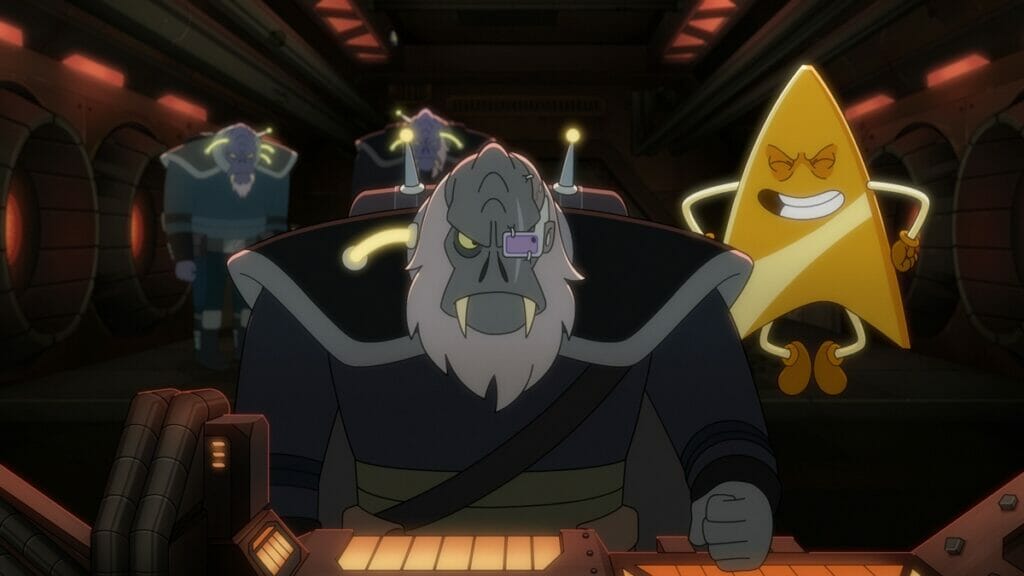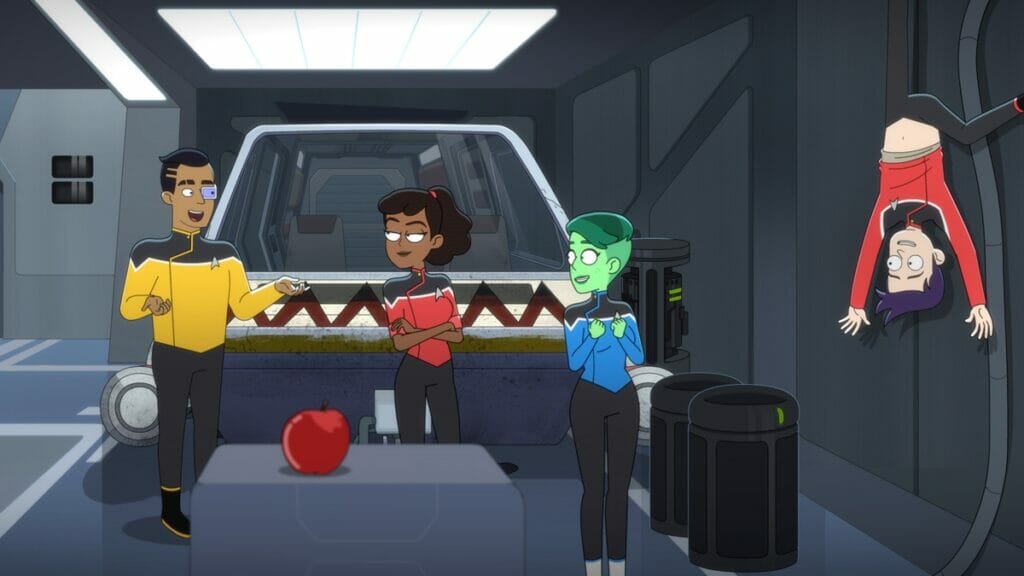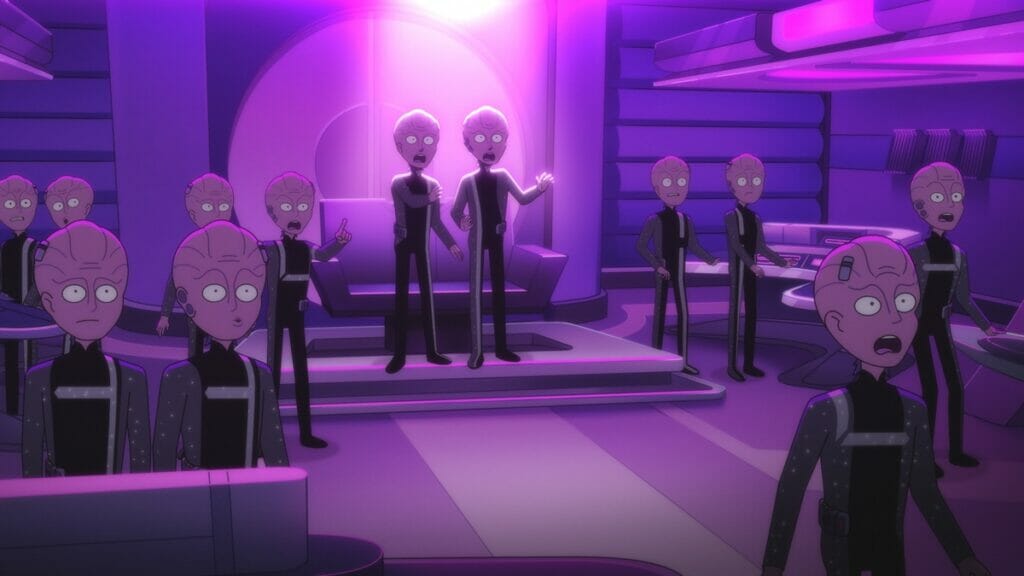“A Few Badgeys More” balances ribbing some of the franchise’s tropes with wholesome sincerity.
This piece was written during the 2023 SAG-AFTRA strikes. Without the labor of the actors currently on strike, the works being covered here wouldn’t exist.
If there’s been a recurring motif in the current era of Star Trek, it’s artificial intelligence that turns evil and threatens to destroy everything and everyone. Discovery’s second season had “Control.” Picard’s first season had synthetic beings ready to exterminate all organic life. Prodigy had a “living construct” poised to wipe out Starfleet. Heck, even Lower Decks itself got in on the action with a pack of rogue autonomous vessels in last season’s finale.
With that context, “A Few Badgeys More” is not merely a follow-up to season 1’s “Terminal Provocations,” which introduced the titular little malevolent mascot or his later escapades. The episode is also a rejoinder to all those climactic, galaxy-threatening events featuring malevolent artificial beings, which have become the stock and trade of nearly every Star Trek series since Discovery burst onto the scene. (And hey, there’s still time to get in on the act, Strange New Worlds!)
Because Lower Decks can boast the sui generis Badgey (Jack McBrayer), able to outstrip his fellow genocidal programs with pure ambition and malevolence. So when an alien vessel attempts to salvage Rutherford’s (Eugene Cordero) old implant, it gives Badgey just the opening he needs to take over and seek revenge on his “father,” the Cerritos, and eventually the entire galaxy. Then, it’s up to Rutherford — with an assist from Mariner (Tawny Newsome) — to stop his creation before it’s too late.
Badgey is easily one of the most iconic elements of Lower Decks and the one with the most success penetrating the zeitgeist (give or take Moopsy). So, while there’s undeniable appeal in bringing him back for one more rodeo, the show runs the risk of resorting to pandering and a case of diminishing returns. Thankfully, “A Few Badgeys More” avoids those pitfalls in a few ways.

First and foremost, the episode is just plain fun when splitting Badgey into his constituent parts, following in the footsteps of The Next Generation’s own Dollars Trilogy tribute — “A Fistful of Datas.” Like its inspiration, and any number of “Captain Kirk outsmarts a robot” episodes of The Original Series, “A Few Badgeys More” plays around with the standard evil robot tropes to entertaining effect.
Rutherford tries to soothe Badgey’s anger with love and acceptance, only to inadvertently peel off a hilariously chipper and positive persona, creatively named “Goodgey.” An attempt to appeal to reason and persuade Badgey that revenge is illogical similarly extracts a persona named “Logicey.” Seeing the interaction between Badgey and his brothers while Rutherford and Mariner try the usual tricks to thwart him to no avail makes for an entertaining setup each time.
Second, Badgey’s return is a boon for the animators. The floating little icon doesn’t move or emote the way the typical characters do. Instead, the imperious hologram comes with a cartoonier, almost Fleischer-esque set of movements and expressions. The way he bobs around the alien ship or makes a truly terrifying face in close-up helps sell Badgey as a thing apart. The chance for the show to experiment with its visual style justifies his return engagement all on its own.
The B-story is a bit less creative in its animation but offers another amusing take on synthetic beings gone awry. It sees the return of both AGIMUS (once again voiced by Star Trek legend Jeffrey Combs) and Peanut Hamper (Kether Donohue). Both A.I.s are plotting to get out of the Daystrom Institute’s rehabilitation center so they can continue wreaking havoc like the wicked computers they are.
There’s great humor in an ending that subverts the audience’s expectations…but there’s also something sincerely wholesome about where everyone lands.
To set the plan in motion, Peanut Hamper prepares a phony story of having reformed after last season’s misadventures for her parole hearing, where Tendi (Noël Wells) will be in attendance. For his part, AGIMUS lures our favorite resident meat pipe, Boimler (Jack Quaid) on over, so AGIMUS can try the old Hannibal Lecter routine, with a promise to help Bradward piece together what’s happening with the mysterious vessel that keeps destroying other ships. (Those poor Binars!)
As usual, Lower Decks zigs when viewers expect it to zag. Instead of AGIMUS and Peanut Hamper teaming up to cause murder and mayhem, AGMIUS reaches their beach rendezvous only to find that his supposed partner in crime has stood him up. He spends the rest of the episode as an amusing sad sack, wondering where it all went wrong. Combs is a delight as always, relishing both the Machiavellian bot side of his character while also doing justice to the regretful rejected side. AGIMUS’ strained efforts to be “good” in the aftermath, up to and including his new soothing blue light, are all quite funny as well.
The best part, though, is that it ends in actual reconciliation and reformation. Through simply pretending to have changed in order to fool the Parole Board, Peanut Hamper realizes she actually has changed and reunites with her dad (a fellow exocomp named Kevin) to make a fresh start.

What’s more, while they were focused on evil deeds, Peanut Hamper and AGIMUS developed a genuine friendship, to where Agimus discovers he genuinely wants to return to group therapy and use the resources at the Daystrom Institute to get better, if only so he can hang out with his pals. There’s great humor in an ending that subverts the audience’s expectations for how a story involving murderous A.I.s usually ends, but there’s also something sincerely wholesome about where everyone lands.
The main story ends on a surprisingly wholesome note, too. In a riff on those universe-threatening A.I.-gone-mad tales of recent Star Trek vintage, Badgey projects himself through subspace, developing the power to demolish the entire cosmos in the process. It’s the worst nightmare of modern Trek since there’s nothing Rutherford can do to stop him. Despite a decent emotional throughline of Rutherford taking Tendi’s lesson to heart — that science is messy and the important thing is to keep trying — in the end, Badgey’s evil plan succeeds anyway, and he attains dominion over all things.
Only, rather than destroying the universe, he reaches enlightenment instead. Amid his grandiose power grab, Badgey realizes that destruction is pointless and ascends to a higher plane of existence, koala and all, in much the same terms that Tendi’s friend O’Connor did back in season 1’s “Moist Vessel.” The touch of continuity in the finish is pleasant.
On the one hand, it’s a funny ending for the conflict with Badgey because rather than the evil A.I. achieving phenomenal cosmic power and using it to decimate everyone, as has been the threat du jour in modern Star Trek, Lower Decks goes in the opposite direction. The twist on the usual formula of Badgey achieving spiritual enlightenment is a laugh at how it diverts from the recent franchise norm.

On the other hand, it’s an oddly inspirational choice. As silly as Badgey’s ascension is, it is true to that animating idea Tendi shared with Rutherford –that even a creation as messed up and perilous as Badgey can walk a rocky path that nonetheless leads them to something sublime and transcendent.
If more Star Trek shows leaned in that direction, rather than trotting out devilish supercomputers and synthetic beings to wreck up the place anytime they’re short on villains, those stories might be a lot more fun and maybe even a smidge more touching.
Funny or not, wholesome or not, thrilling or not, “A Few Badgeys More” is the Lower Decks special. It’s a story that pokes fun at the excesses of Star Trek (even if it’s modern rather than the classic version this time) while circling back to what’s affirming and aspirational within the whole ridiculous premise and helping us discover what made us like it in the first place.
Read next: The Spool's Best New Releases
Streaming guides
The Best Live TV Streaming Services With Free Trial
The praises of live TV streaming services don’t need to be further sung. By now, we all know that compared to clunky, commitment-heavy cable, live TV is cheaper and much easier to manage. But just in case you’re still on the fence about jumping over to the other side, or if you’re just unhappy with ... The Best Live TV Streaming Services With Free Trial
How to Watch Power Book III: Raising Kanan Season 3
Season 3 of the hotly anticipated Power spin-off, Power Book III: Raising Kanan, is arriving on Starz soon, so you know what that means: it’s the ’90s again in The Southside, and we’re back with the Thomas family as they navigate the ins and outs of the criminal underworld they’re helping build. Mekai Curtis is ... How to Watch Power Book III: Raising Kanan Season 3
How to Watch Doctor Who: 60th Anniversary Specials
Ladies and gentlemen, we’re so back! To celebrate Doctor Who’s 60th anniversary, the BBC is producing a three-episode special starring none other than the Tenth/Fourteenth Doctor himself, David Tennant. And to the supreme delight of fans (that would be me, dear reader), the Doctor will be joined by old-time companion Donna Noble (Catherine Tate) and ... How to Watch Doctor Who: 60th Anniversary Specials
Which Netflix Country has Interstellar?
Maybe you’ve just seen Oppenheimer and have the strongest urge to marathon—or more fun yet, rank!—all of Christopher Nolan’s films. Or maybe you’re one of the few who haven’t seen Interstellar yet. If you are, then you should change that immediately; the dystopian epic is one of Nolan’s best, and with that incredible twist in ... Which Netflix Country has Interstellar?
Which Netflix Country Has Each Movie of The Hunger Games?
For whatever reason, The Hunger Games series isn’t available in the same countries around the world. You’ll find the first and second (aka the best) installments in Hong Kong, for instance, but not the third and fourth. It’s a frustrating dilemma, especially if you don’t even have a single entry in your region, which is ... Which Netflix Country Has Each Movie of The Hunger Games?
How to Watch ESPN With A Free Trial
One of the major concerns people have before cutting the cord is potentially losing access to live sports. But the great thing about live TV streaming services is that you never lose that access. Minus the contracts and complications of cable, these streaming services connect you to a host of live channels, including ESPN. So ... How to Watch ESPN With A Free Trial
How to Watch Paramount Network With a Free Trial
To date, Paramount Network has only two original shows on air right now: Yellowstone and Bar Rescue. The network seems to have its hands full with on-demand streaming service Paramount+, which is constantly stacked with a fresh supply of new shows. But Yellowstone and Bar Rescue are so sturdy and expansive that the network doesn’t ... How to Watch Paramount Network With a Free Trial
How to Watch WE TV With a Free Trial
Previously “Women’s Entertainment,” We TV has since rebranded to accurately reflect its name and be a more inclusive lifestyle channel. It’s home to addictive reality gems like Bold and Bougie, Bridezillas, Marriage Boot Camp, and The Untold Stories of Hip Hop. And when it’s not airing original titles, it has on syndicated shows like 9-1-1, ... How to Watch WE TV With a Free Trial
How to Watch TNT Sports With A Free Trial
For many sports fans, TNT is a non-negotiable. It broadcasts NBA, MLB, NHL, college basketball, and All Elite Wrestling matches. And, as a bonus, it also has reruns of shows like Supernatural, Charmed, and NCIS, as well as films like The Avengers, Dune, and Justice League. But while TNT used to be a cable staple, ... How to Watch TNT Sports With A Free Trial
How to Watch Comedy Central With a Free Trial
It’s no coincidence that many of today’s biggest comedians found their footing on Comedy Central: the channel is a bastion of emerging comic talents. It served as a playground for people like Nathan Fielder (Fielder For You), Ilana Glazer and Abbi Jacobson (Broad City), Tim Robinson (Detroiters), and Dave Chappelle (Chappelle’s Show) before they shot ... How to Watch Comedy Central With a Free Trial
How to Watch FX With a Free Trial
You’d be hard-pressed to find a bad show airing on FX. The channel has made a name for itself as a bastion of high-brow TV, along with HBO and AMC. It’s produced shows like Atlanta, Fargo, The Americans, Archer, and more recently, Shogun. But because it’s owned by Disney, it still airs several blockbusters in ... How to Watch FX With a Free Trial